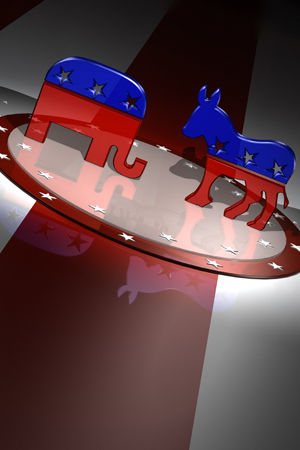Politics
How to Make Political Discussions Less Contentious
Polarization is causing decreased civility and gridlock.
Posted December 17, 2015
By Katja Wiemer and Jane Neal, guest contributors
As families reunite across the country to celebrate the holidays, many brace for the tension that arises when the conversation turns political.

All too often these debates quickly turn into frustrating stalemates rather than informed discussions that help refine our views. Yet, debates are an important cornerstone in a flourishing democracy. Only a few decades ago, many people lamented the fact that there was not enough of a difference between the two major political parties.
The increasing “polarization” of political discourse in the United States goes well beyond the unpleasantness around Aunt Harriet’s dinner table. It’s also of interest to psychologists who examine how people critically process political information.
In a review of party polarization in the United States, Layman, Carsey & Horowitz (2006) discuss three possible negative consequences of ideological polarization. Hardened and uncompromising stands on both sides can lead to:
- “legislative gridlock,” with the process of policymaking becoming more drawn out or even shut down;
- decreased civility in political debate, including within the government bodies, the media and between citizens; and
- lowered confidence in government, along with low turnout in elections and overall political disengagement.
Scientific research has shown that the extremity of our views on political issues often correlates with how confident we are that we understand the issues.
And, for the most part, it appears that we tend to feel overconfident, overestimating the extent to which we understand the policies we attack or defend. Surprisingly, we may end up most passionately defending views on issues that we really don’t fully understand.
If true, might we be able to have more civil debates and be more willing to compromise if we were simply less confident that we were are right?
In 2013, Fernbach, Rogers, Fox and Sloman tested this possibility. They had 198 individuals with diverse political views rate their agreement with six policies on a scale ranging from 1, for “strongly against,” to 7, for “strongly in favor.” A rating of 4 indicated a neutral stand, while ratings closer to the upper and lower end of the scale indicated more extreme stands.
Participants rated their understanding of the policies. Next, they were given two of the six policies and asked to give explanations of how those policies would work. Because we are only able to explain things that we understand well, the task served as an effective reality check for participants, informing them about their actual grasp of policy.
Following these explanations, they once again rated their understanding of the two policies and their positions on the issues. Additionally, they rated their certainty regarding their positions.
When forced to explain the policies, participants ended up rating their level of understanding as being lower than their initial rating. Amazingly, this led them to take more moderate stands on those policies.
One way to interpret these findings is that being forced to explain a political position led participants to be less overconfident and therefore less extreme in their positions. Importantly, participants did not change their political views, but simply lessened the extremity.
Other studies have shown that explaining why one agrees or disagrees with a particular policy can further polarize our views, which may be one reason that political discussion can get so heated.
So what can we do to avoid angry disagreements? Based on the findings, here are three suggestions:
- When expressing your views, take a constructive approach that focuses on the goals that you share with others, and look for ways to lead the discussion toward specifics of proposed solutions and away from how you and your conversation partners feel about them.
- Practice listening and cultivate a tone of openness and interest. Steering into a conversation about how policies may work helps prevent polarization of the discussion, and your conversation partner will likely be more open and less defensive when you take this approach.
- Stay away from questions that will put your conversation partner on the defensive, such as, “How can you support this?” or “Why are you against this policy?” These questions are much more personal and will take the conversation more deeply into opinions and emotions—and away from common goals and constructive discussion.
So, the next time your holiday dessert is served with a side of political friction, remember to take a deep breath, and get those explanations rolling. But make sure you offer and ask for explanations of policies, rather than reasons for disliking or supporting them. The friendly holiday toast will mean so much more.
Katja Wiemer is an associate professor for cognitive psychology and cognitive science at Northern Illinois University where she teaches courses on cognition, perception and interdisciplinary approaches to the mind. Her current research interests focus on knowledge representation of abstract concepts, processes related to scientific explanations and biases in information processing.
Jane Neal holds a master of science degree from University College London and is currently working toward her Ph.D. in psychology at Northern Illinois University. She teaches courses on introductory psychology and research laboratories in perception. Her research interests include cognitive and neurological approaches to knowledge representation as well as causal reasoning.
References
Alter, A. L., Oppenheimer, D. M., & Zemla, J. C. (2010). Missing the trees for the forest: A construal level account of the illusion of explanatory depth. Journal of Personality and Social Psychology, 99(3), 436- 451.
Fernbach, P. M., Rogers, T., Fox, C. R., & Sloman, S. A. (2013). Political extremism is supported by an illusion of understanding. Psychological science, 24(6), 939-946.
Layman, G. C., Carsey, T. M., & Horowitz, J. M. (2006). Party polarization in American politics: Characteristics, causes, and consequences. Annual Review of Political Science, 9, 83-110.




